Ford Puma vs Polestar 2 - Differences and prices compared
Compare performance (168 HP vs 476 HP), boot space and price (24800 £ vs 42000 £ ) at a glance. Find out which car is the better choice for you – Ford Puma or Polestar 2?
Costs and Efficiency:
Looking at overall running costs, both models reveal some interesting differences in everyday economy.
Ford Puma has a convincingly advantage in terms of price – it starts at 24800 £ , while the Polestar 2 costs 42000 £ . That’s a price difference of around 17220 £.
In terms of energy consumption, the advantage goes to the Ford Puma: with 13 kWh per 100 km, it’s to a small extent more efficient than the Polestar 2 with 14.80 kWh. That’s a difference of about 1.80 kWh.
As for electric range, the Polestar 2 performs clearly perceptible better – achieving up to 659 km, about 242 km more than the Ford Puma.
Engine and Performance:
Under the bonnet, it becomes clear which model is tuned for sportiness and which one takes the lead when you hit the accelerator.
When it comes to engine power, the Polestar 2 has a convincingly edge – offering 476 HP compared to 168 HP. That’s roughly 308 HP more horsepower.
In acceleration from 0 to 100 km/h, the Polestar 2 is clearly quicker – completing the sprint in 4.20 s, while the Ford Puma takes 7.40 s. That’s about 3.20 s faster.
In terms of top speed, the Ford Puma performs slight better – reaching 210 km/h, while the Polestar 2 tops out at 205 km/h. The difference is around 5 km/h.
There’s also a difference in torque: Polestar 2 pulls clearly stronger with 740 Nm compared to 290 Nm. That’s about 450 Nm difference.
Space and Everyday Use:
Whether family car or daily driver – which one offers more room, flexibility and comfort?
Both vehicles offer seating for 5 people.
In curb weight, Ford Puma is convincingly lighter – 1316 kg compared to 2015 kg. The difference is around 699 kg.
In terms of boot space, the Ford Puma offers somewhat more room – 456 L compared to 405 L. That’s a difference of about 51 L.
In maximum load capacity, the Ford Puma performs barely noticeable better – up to 1216 L, which is about 121 L more than the Polestar 2.
When it comes to payload, Ford Puma to a small extent takes the win – 469 kg compared to 421 kg. That’s a difference of about 48 kg.
Who wins the race in the data check?
The Polestar 2 is clearly superior overall in the objective data comparison.
This result only shows which model scores more points on paper – not which of the two cars feels right for you.
Costs and Consumption
View detailed analysis
Engine and Performance
View detailed analysis
Dimensions and Body
View detailed analysis
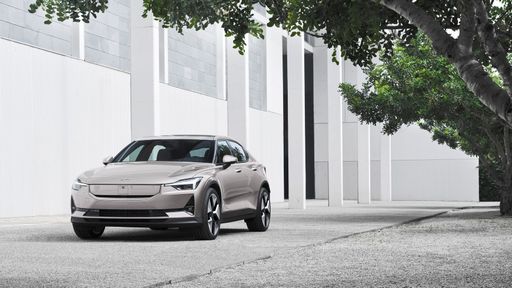
Polestar 2
Ford Puma
The Ford Puma is a cheeky compact crossover that blends sporty styling with city-friendly practicality, giving drivers a surprisingly fun and composed ride. With clever storage tricks and a lively personality, it’s a smart pick for buyers who want enjoyment without fuss.
details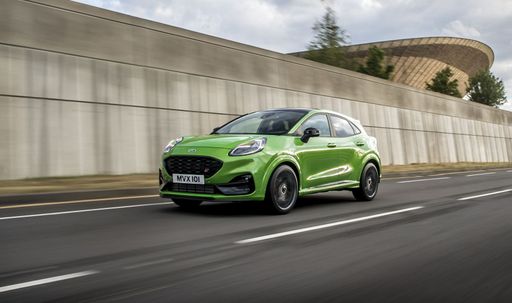
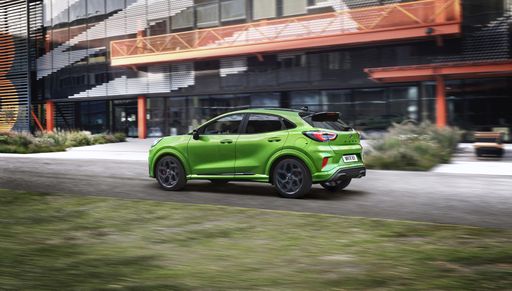
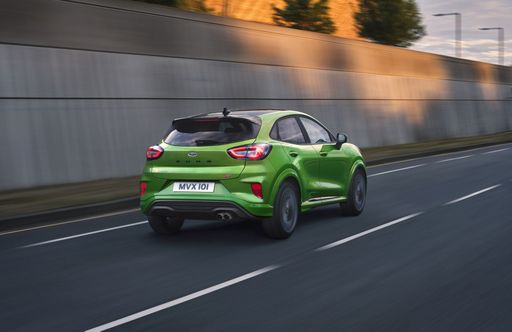
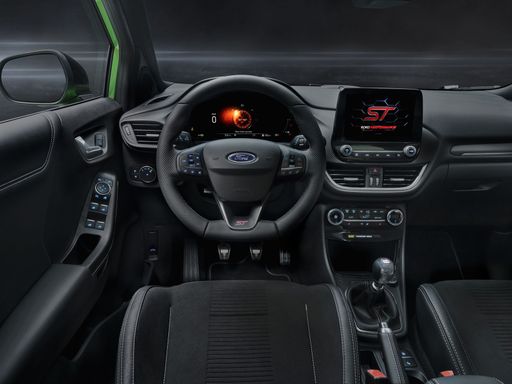
Polestar 2
The Polestar 2 is a crisp, Scandinavian-styled electric liftback that pairs minimalist luxury with a focused, driver's attitude. It feels agile and composed whether you’re commuting or heading out for the weekend, with a tech-forward cabin and enough personality to make everyday driving a bit more fun.
details
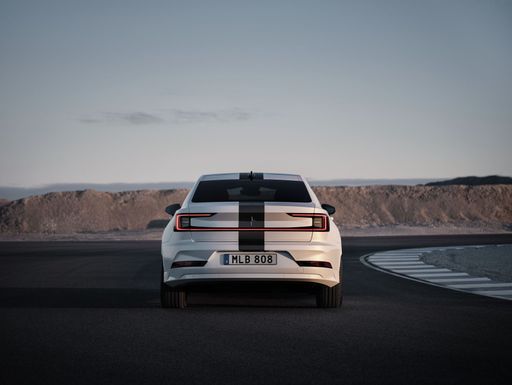
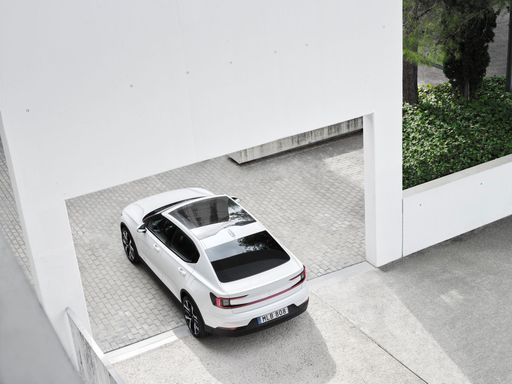
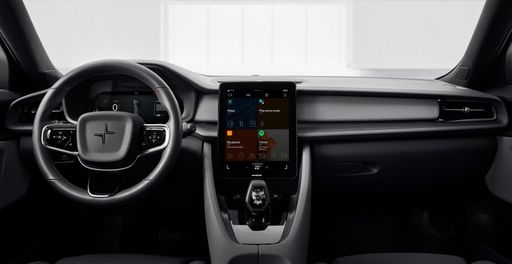
Costs and Consumption |
|
|---|---|
|
Price
24800 - 36300 £
|
Price
42000 - 57400 £
|
|
Consumption L/100km
5.4 - 5.9 L
|
Consumption L/100km
-
|
|
Consumption kWh/100km
13 - 13.7 kWh
|
Consumption kWh/100km
14.8 - 16.8 kWh
|
|
Electric Range
404 - 417 km
|
Electric Range
554 - 659 km
|
|
Battery Capacity
-
|
Battery Capacity
78 kWh
|
|
co2
0 - 135 g/km
|
co2
0 g/km
|
|
Fuel tank capacity
42 L
|
Fuel tank capacity
-
|
Dimensions and Body |
|
|---|---|
|
Body Type
SUV
|
Body Type
Sedan
|
|
Seats
5
|
Seats
5
|
|
Doors
5
|
Doors
5
|
|
Curb weight
1316 - 1563 kg
|
Curb weight
2015 - 2188 kg
|
|
Trunk capacity
456 L
|
Trunk capacity
405 L
|
|
Length
4186 - 4226 mm
|
Length
4606 mm
|
|
Width
1805 mm
|
Width
1859 mm
|
|
Height
1550 mm
|
Height
1473 - 1479 mm
|
|
Max trunk capacity
1216 L
|
Max trunk capacity
1095 L
|
|
Payload
367 - 469 kg
|
Payload
375 - 421 kg
|
Engine and Performance |
|
|---|---|
|
Engine Type
Petrol MHEV, Electric
|
Engine Type
Electric
|
|
Transmission
Manuel, Automatic
|
Transmission
Automatic
|
|
Transmission Detail
Manual Gearbox, Dual-Clutch Automatic, Reduction Gearbox
|
Transmission Detail
Reduction Gearbox
|
|
Drive Type
Front-Wheel Drive
|
Drive Type
All-Wheel Drive, Rear-Wheel Drive
|
|
Power HP
125 - 168 HP
|
Power HP
272 - 476 HP
|
|
Acceleration 0-100km/h
7.4 - 9.8 s
|
Acceleration 0-100km/h
4.2 - 6.4 s
|
|
Max Speed
190 - 210 km/h
|
Max Speed
205 km/h
|
|
Torque
170 - 290 Nm
|
Torque
490 - 740 Nm
|
|
Number of Cylinders
3
|
Number of Cylinders
-
|
|
Power kW
92 - 124 kW
|
Power kW
200 - 350 kW
|
|
Engine capacity
999 cm3
|
Engine capacity
-
|
General |
|
|---|---|
|
Model Year
2025 - 2026
|
Model Year
2024
|
|
CO2 Efficiency Class
D, A
|
CO2 Efficiency Class
A
|
|
Brand
Ford
|
Brand
Polestar
|
Is the Ford Puma offered with different drivetrains?
The Ford Puma is offered with Front-Wheel Drive.
